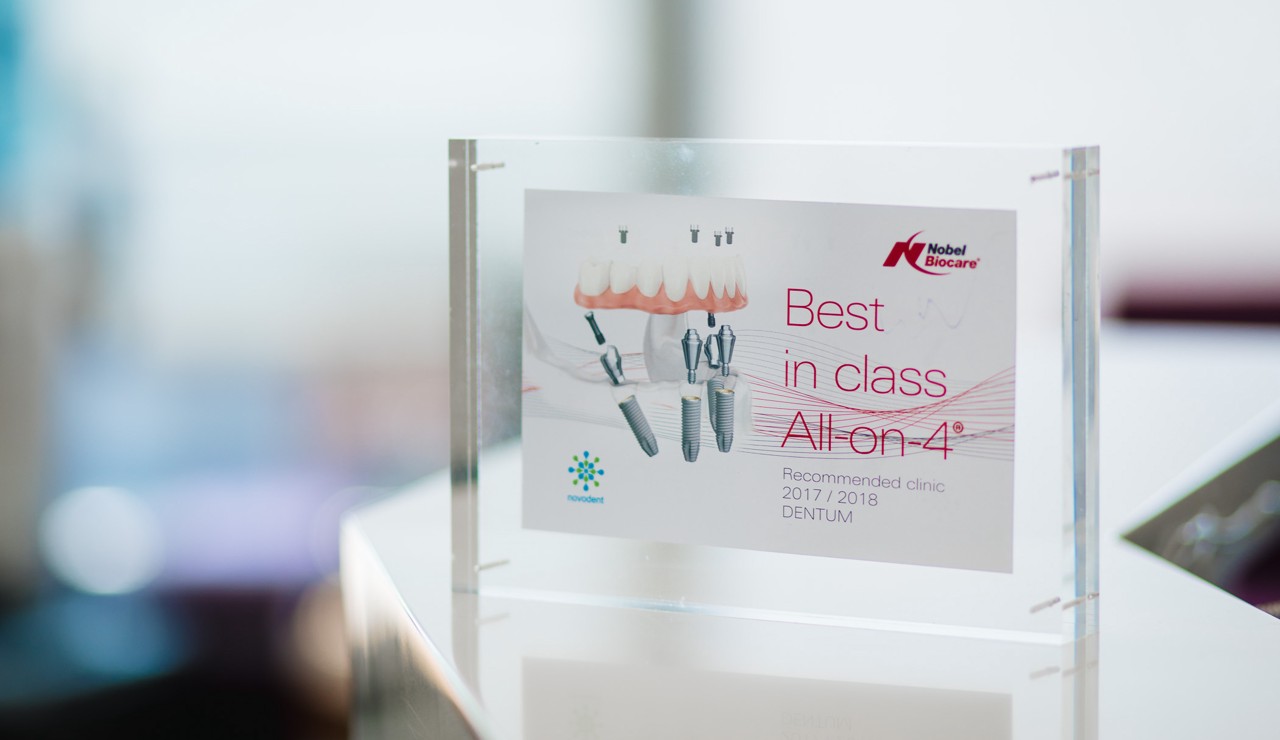Short Guide: Different types of materials used in All-on-4® grip

Knowing the differences between different types of materials is crucial to ensure long-term satisfaction with the results.
The concept of the All-on-4® procedure is an economical solution that does not require additional bone implantation, and allows patients a fixed solution already on the day of surgery. We always emphasize the importance of using Nobel Biocare implants in All-on-4 procedures, but there are also various types of prosthetic material that should be paid attention to. There are several important differences between materials used in the manufacture of prosthetics in a dental laboratory.
There are three main types of prosthetic part of the All-on-4 procedure:
- Acrylic (temporary)
- Composite (permanent)
- Ceramic (permanent)
In this short guide, we will approximately explain the differences between the listed prosthetic works and list the pros and cons, so that you can more easily understand which is the best option for you when you decide on an All-on-4 procedure.
Acrylic All-on-4 (basic quality)
Often times, if the clinic offers the All-on-4 method at a very low cost, much lower than the others, you can be quite sure that they use acrylate in prosthetic work. Acrylic dentures themselves are not bad, but beware - they are only a temporary prosthetic solution and their purpose is not to be permanent.
The results of the study showed that over a five-year period, ceramic and acrylic work have a similar effect from the point of view of oral health and bite strength, but the researchers also found a stronger flow of sulcuses in acrylic dentures after three years. Higher rates of sulcus flow are associated with more inflammation and eventual bone resorption. The results indicated that after a long time, acrylic dentures may wear off earlier than expected. Acrylic dentures also had stronger abrasion and in a quarter of the observed patients the acrylic artificial teeth were cracked, while the ceramic teeth remained undamaged.
All of the above points to the fact that a lower price of acrylic prostheses would probably not be profitable in the long run, since they would most likely have to repair the damage that would appear on them. In most cases, it may be necessary to remove the entire structure and replace it after a few years.
We at Dentum do not offer acrylic All-on-4 as a final work, but exclusively as temporary teeth.
ADVANTAGES
- lower price
- easily replaceable
IMPERFECTION
- standardized shapes and sizes, there is no room for aesthetic adjustments as desired by the patient
- they don't last long
- easier to shoot and more susceptible to damage
- may darken due to poor oral hygiene
- Ultimately higher costs
Composite All-on-4 (premium quality)
The composite All-on-4 has a milling structure made of titanium or Bio Hpp material. If you choose this material, it is extremely important to keep in mind that the structures used for the All-on-4 method are milled or printed, because only such a procedure ensures the precise location of the implant (≤3 μm) and the passivity of the work itself. Ask your dentist about it. One of the biggest advantages of composites is that it can be maximally individualized to accommodate your preferences. Unlike ceramics, it is less rigid which means it is less prone to cracking.
ADVANTAGES
- material very similar to natural teeth
- aesthetically very satisfying
- the possibility of maximum personalization of the final work
- very durable
IMPERFECTION
- due to the similarity with natural teeth, there is a possibility that the material may change color over time (but it can be easily polished and restored to its original state)
- more expensive than acrylate
Ceramic All-on-4 (premium quality)
To perform a ceramic All-on-4 requires an experienced dentist who works with highly trained dental technicians, because the production of ceramic restoration Of All-on-4 is very complex and requires great skill and knowledge. For this method, individual ceramic crowns based on zircon or metal are made, which are placed on the so-called "Malo" construction. The result is superior aesthetics and functionality of permanent work.
ADVANTAGES
- top aesthetics, looks natural
- not subject to color change
- long-term durable
- in case of damage, only the damaged tooth can be replaced, the entire structure should not be changed
IMPERFECTION
- More expensive than composite
- ceramic structures are heavier than acrylic and composite structures
As with all things in life, there is no solution for all. That is why we offer a free first examination with a consultation with our dentist, to discuss your wishes and needs and find the best solution for you.
We will be happy to help you organize your arrival in Dentum, call us and order for your first free examination!